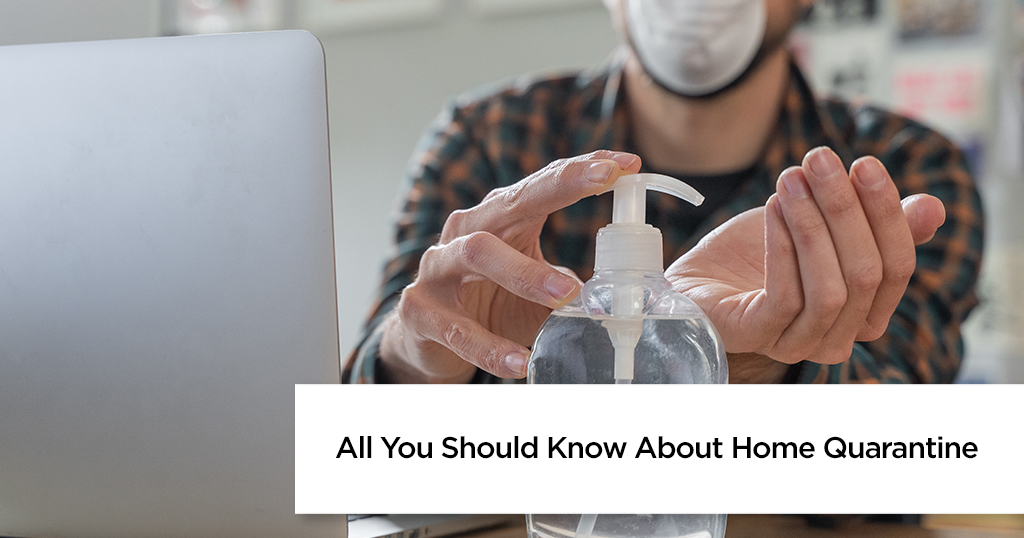With coronavirus (COVID-19) dominating the news every day, you get to hear a lot about the word, like ‘quarantine’ with an uneasy casualness. But, do you know what this word really means?
Quarantine does not have to be a scary thing. It is an effective way to protect the public. If you are in home quarantine despite being healthy, it is because you have been travelling abroad or have been in close contact with an individual with COVID-19.
What is Quarantine?
Quarantine is a place or state of isolation for an individual or an animal who may have come in contact with contagious diseases. The period of isolation reduces the chance that individual or animal could transfer disease to others.
Quarantine is not reserved just for sick people only. Individuals who appear healthy can actually spread an infection without ever knowing they were carriers. That is why, travellers who look healthy are still quarantined, depending on where they are coming from.
Home Quarantine
Home Quarantine means to stay at home and avoid contact with anyone, if you have been exposed to, or developed an infectious disease, till the infectious period of the disease is over, or until you come know that you have not contracted a disease to which you were exposed. Quarantine helps in slowing down the spread of infection across a population.
Who should be in home quarantine?
Home quarantine is applicable for inviduals without symptoms of COVID-19 but who have been in contact with a confirmed case. As per the Ministry of Health & Family Welfare (MoHFW), Directorate General of Health Services, Government of India, a contact is defined as following:
- A person living in the same household as a COVID-19 case
- A person having had direct physical contact with a COVID-19 case
- A person who was in a closed environment or had face to face contact with a COVID-19 case at a distance of within 1 meter including air travel
The period of home quarantine is for 14 days from contact with a confirmed case or earlier, if a suspect case (of whom the index person is a contact) turns out negative on laboratory testing
Instructions for people (contacts) being home quarantined
- Stay away from pregnant women, elderly people, children and individuals with co-morbidities within the household.
- Restrict movement of the contact within the house.
- Do not attend social/religious gatherings e.g. wedding, condolences, etc. under any circumstances
- Strictly follow hand hygiene rules
- Do not share household items, such as utensils, clothes, towels etc. with the family members
- Use surgical masks at all times. Change masks every 6 to 8 hours. Do not reuse masks. Dispose off masks separately and treat discarded masks as biohazards
- If symptoms appear immediately inform the nearest health center or call: 011-23978046
Instructions for the family members of an individual being home quarantined
- Only an assigned family member should be tasked with taking care of the such person
- Avoid shaking the soiled linen or direct contact with skin
- Use disposable gloves when cleaning the surfaces or handling soiled linen
- Wash hands after removing gloves
- Visitors should not be allowed
- In case the person being quarantined becomes symptomatic, all his close contacts will be home quarantined (for 14 days) and followed up for an additional 14days or till the report of such case turns out negative on lab testing
Environmental sanitation
- Clean and disinfect frequently touched surfaces in the quarantined person’s room (e.g. bed frames, tables etc.) daily with 1% Sodium Hypochlorite Solution.
- Clean and disinfect toilet surfaces daily with regular household bleach solution/phenolic disinfectants
- Clean the clothes and other linen used by the person separately using common household detergent and dry them separately
Conclusion
Home quarantine means you must reduce contact with other people as much as possible. You do not have to be completely isolated. You must not go to work or school, or do any other activities, and you must not travel on public transport (bus, tram, underground, train, air or ferry).
Home quarantine lasts for 14 days after you have been exposed to infection. If you start coughing, develop a throat infection or fever or experience difficulty breathing, contact the nearest health centre or call: 011-23978046 immediately.
Source: https://www.mohfw.gov.in/DraftGuidelinesforhomequarantine.pdf
Does COVID-19 spread from person to person?
Yes. The disease can spread from person to person through small droplets from the nose or mouth which are spread when a person with COVID-19 coughs or exhales. These droplets land on objects and surfaces around the person. People can also catch COVID-19 by touching these objects or surfaces, then touching their eyes, nose or mouth. In addition, people can catch COVID-19 if they breathe in droplets from a person with COVID-19 who coughs out or exhales droplets. This is why it is important to stay more than 1 meter (3 feet) away from a person who is sick.
The airborne route of transmission is under investigation. Of late, this has acquired a ‘superspreader’ status, wherein cases have been implicated through asymptomatic transmission or in some where the mode of transmission is unexplainable.


















